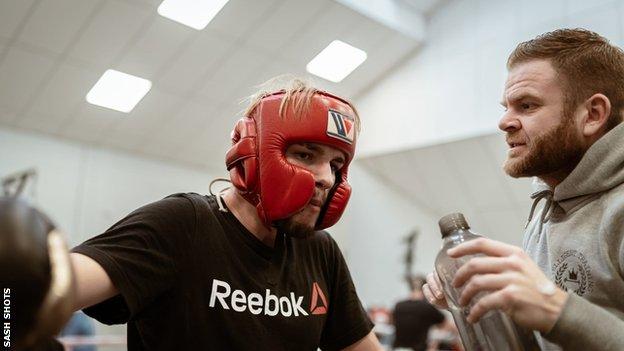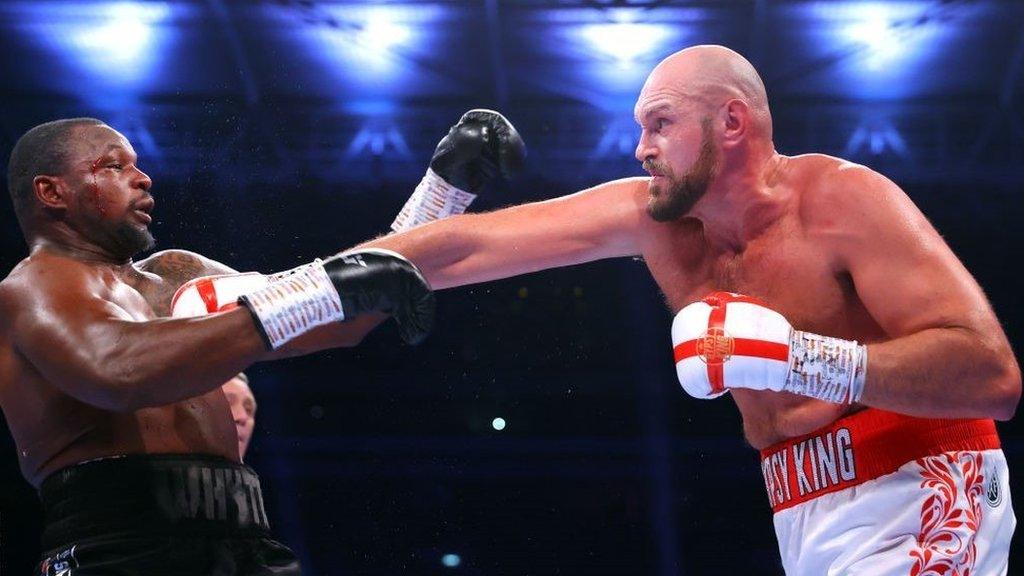Small Hall Spotlight: 'If I win this belt, maybe I can forget about being homeless' - The home town fighter's struggle
- Published

Dean Dodge struggles to makes ends meet as the home corner fighter
After the last Small Hall Spotlight showed the journeyman perspective, this month focuses on the home corner.
What is it like to turn professional and try to build a career on the small hall circuit? How hard is it to reach the promised land of televised shows, title fights and big money?
In what will be his 12th pro contest, Yeovil's Dean Dodge makes his second attempt at winning the Southern Area championship on 22 April, at London's York Hall. Currently living in a hostel for rough sleepers, he believes a win there can be the start of better things.
Dodge's situation may be particularly acute, but his boxing journey bears similarities to most early career fighters, known as 'prospects' in the trade.
Since discovering boxing as an eleven-year-old, amassing a 47-fight amateur card, then turning pro at 22 with Birmingham trainer Jon Pegg, Dodge's career has revolved around ticket sales, day jobs, health concerns and other uncertainties. Despite that, he professes a deep, undying passion for the sport.
"It might sound funny," he says. "But there's something about getting hit. I actually love getting hit. I love what it does to me, and I love having a war. I love everything about boxing. I guess you have to, to want to do this."
Pro fighters from Yeovil are something of a rarity, meaning the announcement of Dodge's professional debut in 2016 caused considerable local fanfare. The accompanying publicity helped him sell over 100 tickets, although the bout was scheduled to take place in Bournemouth, 50miles away.
"Obviously, the distance makes it harder," he says. "When people know they've got to drive an hour and a half to the show, they're more reluctant to support you. But I'm always putting messages out. I even put ads in newspapers, and generally make a pest of myself. I graft to sell because I know it's important."
Dodge trained hard and got his weight down but was to suffer bitter disappointment when his pre-fight brain scan turned up an anomaly. His license was suspended, and the contest cancelled.
"The boxing board said I might have an aneurysm, which was a scary thing to hear. They needed a second opinion from a doctor," Dodge explains. "But it was down to me to organise it and it took about a year, getting appointments with specialists and going back and forth.
"In the end it was just luck, really. I met a girl on Tinder whose dad happened to be a neurologist, and he helped me get it sorted."
Allow X content?
This article contains content provided by X. We ask for your permission before anything is loaded, as they may be using cookies and other technologies. You may want to read X’s cookie policy, external and privacy policy, external before accepting. To view this content choose ‘accept and continue’.
The entire episode, which caused Dodge huge stress and led to his first period of homelessness after falling out with his mother, had been caused by a benign fatty deposit. Once correctly diagnosed, his license was reinstated, and he won a rearranged debut against seasoned journeyman Kristian Laight in September 2017.
He then embarked on a three-year, nine-fight unbeaten run, yet his struggles outside the ring went on.
"I've had several spells of homelessness," Dodge says. "It's something that's followed me throughout my twenties, and of course it affects me.
"I often seem to be sofa surfing or sleeping in my car. I've had jobs, working in factories or labouring, but it's hard to make ends meet. I've never really had any money and people think you get well paid as a fighter, but it's not true. If you can't get big sponsorship deals, then you're working full time and training, which really isn't easy.
"You feel like you're caught between two worlds.
"My best night financially was when I boxed in my hometown (against Lee Connelly in 2019) and I sold 350 tickets. It's shame I can't box in Yeovil more often, but it's not a big boxing place.
"Other than that, it's been heavy going at times. For example, when I boxed Nathan Kirk, in my sixth fight [in Bournemouth] it was just before Christmas, and it was tough to get people out.
"I didn't shift as many tickets as usual. I had to pay Nathan £1,300 as my opponent, and that left me with £200. I knocked him out, as well and you're thinking - I trained for months for this. This doesn't add up."
The Yeovil man then took his first crack at the Southern Area super-featherweight title. But by the time he boxed Sidcup's Danny Carr in Bolton, under lockdown conditions in February 2021, economic realities had again taken their toll.
"I don't want to make excuses, but I had been living at my girlfriend's place. Then we split up, so I ended up sleeping in my car again," he remembers.
"That was five weeks before the fight, which obviously messed up my preparation. I don't want to take anything away from my opponent. He boxed well and deserved it, but I wasn't in a good state."
A period of depression followed, and Dodge admits succumbing to dark thoughts. His first professional loss, the ending of his relationship and the continued insecurity of his housing status were a lot to bear.
Now finally settled, with a steady place in a hostel, he has refocused on his boxing.
Dodge has been training in Wales with former world light-welterweight champion Gavin Rees. Large framed for a super-featherweight, with power in both hands, the 28-year-old feels he is much better positioned to take his opportunity this time.
"What happened last year put everything in perspective," he says. "It was a learning experience.
"Now I just need to win this belt. If I win it, I can forget about being homeless and forget about all those bad nights, at least for a while. I will feel like I'm turning the corner. It will all be worth it."

THE KITCHEN GADGETS TIME FORGOT: Do you recognise any of these long-forgotten kitchen tools?
FROM THE KGB TO THE KREMLIN: The revealing story of Putin's rise to power

Related topics
- Published16 October 2022
